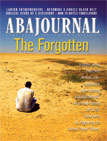'Eliot Ness of Iraq' Wins Asylum
<a href=”http://www.abajournal.com/magazine/the_forgotten/” title=”

It was a great Independence Day gift. On July 3, Judge Radhi Hamza al-Radhi, “the Eliot Ness of Iraq,” learned that the Department of Homeland Security had granted him asylum.
After the 2003 invasion, American advisers in Baghdad insisted that Radhi head Iraq’s version of the FBI. Radhi had a sterling reputation, and he had been tortured by Saddam Hussein for making decisions based on law rather than political favoritism. Radhi relentlessly pursued 3,000 corruption cases—many leading to the new, U.S.-supported administration of Iraq Prime Minister Nouri al-Maliki. And the government reaction proved as dangerous as Hussein’s.
“I thank the American people who supported us through this journey,” Radhi told the ABA Journal today through a translator. “I finally feel the safety that my family and I lost in Iraq when I worked with the Commission on Public Integrity. We have something that everyone in the world wants—a safe home, a decent education for my son and the opportunity to live in freedom.”
Radhi, who was featured in the Journal’s July cover story “The Forgotten” dodged numerous assassination attempts, including a rocket attack that destroyed his home, and 31 of his investigators and their family members were murdered, some tortured to death with power drills.
Last fall, Radhi presented his findings to the House Committee on Oversight and Government Reform. He documented how Iraq’s oil pipeline was sabotaged by a militia supported by a Maliki official and how Iraq’s health ministry was controlled by an anti-American militia which sold stolen hospital supplies to buy weapons to use against U.S. troops.
Two days after Radhi’s testimony, Maliki fired Radhi, denouncing him as a traitor. Radhi and his security chief asked for asylum. He, his security chief and their families crowded into a Northern Virginia townhome to await the U.S. government’s decision. Legally prohibited from working, the men survived thanks to donations from Holland & Knight attorneys and former State Department colleagues.
“We are truly grateful to the Department for providing Judge Radhi and his family permanent security and safety in the United States.,” said Holland & Knight’s Chris Nugent, who represented Radhi.
“This case was quite a roller coaster ride for all of us, taking me all the way to Scotland over Christmas to visit with Judge Radhi’s son as he faced deportation from the U.K. to Iraq, until we later secured his reunification with his family in the United States through humanitarian parole.”



